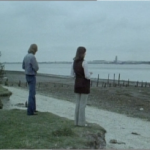BY DAVID ROLINSON
Interview recorded in London on 3 July 2006
Play for Today Writer: Alan Plater; Director: Brian Parker; Producer: David Rose
This piece assumes background knowledge of the play.1 For a short essay and synopsis, see my piece for Screenonline. For detailed analysis and mention of other Plater sources, see my article ‘The Surprise of a Large Town: Regional Landscape in Alan Plater’s Land of Green Ginger’, Journal of British Cinema and Television, 4:2, November 2007, pp. 285-306, available in print or online. Plater also wrote the lovely memoir Doggin’ Around. If you want to research Plater’s work, I can provide a full interview transcript; I strongly recommend the University of Hull’s Alan Plater archive at the Hull History Centre. I am eternally grateful to Alan Plater (who sadly passed away in 2010) and Shirley Rubenstein for their time, warmth and generosity.
[ATV] had a project to do a 6-part series called A Tale of Six Cities […] and I wrote a play, and it was actually called The Surprise of a Large Town, from Philip Larkin’s poem.2 The project came to nothing […] they never made this series, and I just put it on a shelf. Cut to early ‘70s: David Rose is Head of Drama for BBC in Birmingham at Pebble Mill and he called me up […] – he would often do this – he said, “I need a 60-minute play or a half-hour piece, have you got anything on the shelf that we could look at?” I said, well, I’ve got this thing about Hull but you’d have to go to Hull. By this time of course it was now accepted you could actually go out on location and make plays on location. Because when I first wrote it, it was going to be studio-based with some little inserts. And that, I think, scared them a bit, because they would’ve had to send a camera to Hull and some actors and so on. So there’d been a cultural change by the time David approached me.
Continue reading “Interview with Alan Plater about Land of Green Ginger (1973)”
I have selected only a few quotations from a detailed interview, and have left out my questions which sometimes prompted points – for instance, a ‘house style’ at BBC Birmingham – but every word here was spoken by Alan Plater and has not been twisted out of context. Where comments have been moved from a different stage of the interview, this is indicated in footnotes. Italicised text in [brackets] offers further guidance and ellipses are indicated by […]) ↩
Larkin’s poem, titled Here, is discussed in my article. ↩


